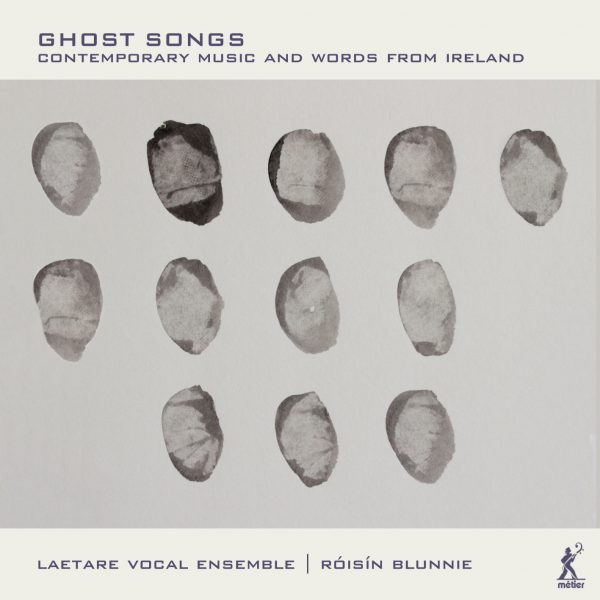Fanfare
This disc is a true meeting of poetry and music. Poems are read out, beautifully, by the four readers listed in the headnote; four composers add their reactions to some of those poems in the most breathtakingly beautiful settings. The texts come from poetry by Paula Meehan, the plays of Marina Carr, and the bilingual collections of Dairena Ní Chinnéide, plus Irish-American poet Lola Ridge and others. Themes explored concentrate on the liminal, that intersection of states between life and death, this world and the next.
This is a multi-genre album, then. The readings are impeccable: Irish listeners will doubtless recognize the radio voice of Carl Corcoran. His reading of the famous “Do not stand at my grave and weep” (attributed to Mary Elizabeth Frye) is one of the highlights. One has to imagine the inclusion of an audible page turn in track 17 (an extract from Marina Carr’s “Indigo” read by Carr herself) is deliberate, given the attention to detail in all aspects of this release. The intersection between contemporary Irish poetry, music, and culture is irresistible; the addition of a harp to Ní Chinnéide’s reading of her own “Tairseach Toinne / Morning Raga” is magical. Some poems make direct reference to music in their text. Lola Ridge’s “Under-Song” is a case in point, while Seán Doherty’s setting of that is a little miracle, a held-breath response delivered with great beauty and depth by the 36-strong chamber choir Laetare Vocal Ensemble.
The choral pieces form major articulating points in the listener’s experience and, just as in the case of the poems, convey a series of emotions evoked by the central themes. Listen to the solace-like warmth of Doherty’s setting of “Down by the Salley Gardens,” for instance, and contrast that to Rhona Clarke’s primal setting of the traditional text “The Old Woman” (complete with added percussion). Sometimes there is a lighter touch: Paula Meehan’s poem “The Old Neighbourhood” refers to a “psychic Skype” between the living and those who have passed over, while those of a lesser Christian disposition will welcome Paula Meehan’s poem “At the Spring Equinox.” It’s interesting to hear how the poet brings out accents and rhythms within the poem in her own readings; listen to how in “The Graves at Arbour Hill” we hear not only that, but also immediately Seán Doherty’s musical setting.
The exception to the reading—musical setting—reading format is Oileán / Amhrán Mhuínse, in which a drone connects reading and song into one evocative, timeless entity. There are other “sleights of hand,” all within the remit and all effective. Composer Michael Holohan inserts part of the Latin Requiem into his setting of Seán Ó Ríordáin’s “Bagairt na Marbh” (The Threat of the Dead).
There is warmth here (Doherty’s setting of “Down by the Salley Gardens”) as well as a true pinpointing of the heart of grief and, with it, meditations on the mysteries of separation and the beyond. The concept of alternations of poetry and music works on the profoundest level. One tiny criticism: the cut-off from the final song is too quick; a little of the ambience could have been left so the music resonates more. This is nothing to detract from a full recommendation, though. Unforgettable.
@divineartrecordingsgroup
A First Inversion Company
Registered Office:
176-178 Pontefract Road, Cudworth, Barnsley S72 8BE
+44 1226 596703
Fort Worth, TX 76110
+1.682.233.4978
We noticed you're visiting from United States (US). We've updated our prices to United States (US) dollar for your shopping convenience. Use Pound sterling instead. Dismiss



![🎧 Listen now to the @purcellsingers' first single from their upcoming album, #ASpotlessRose! ➡️ listn.fm/aspotlessrose [in bio]](https://scontent-dfw5-2.cdninstagram.com/v/t51.71878-15/642752592_1424641949105789_8815810652567824072_n.jpg?stp=dst-jpg_e35_tt6&_nc_cat=106&ccb=7-5&_nc_sid=18de74&efg=eyJlZmdfdGFnIjoiQ0xJUFMuYmVzdF9pbWFnZV91cmxnZW4uQzMifQ%3D%3D&_nc_ohc=1oI-Pe3rGJ4Q7kNvwH7hMhb&_nc_oc=AdngzVIcLuBFnUfiKxhMEL31MOMOBAqH-gLXcxU3XU_73jFdmffXrV_53quypxOSnqs&_nc_zt=23&_nc_ht=scontent-dfw5-2.cdninstagram.com&edm=ANo9K5cEAAAA&_nc_gid=1ZHVcN5m1a2yuJkz4FNtUA&_nc_tpa=Q5bMBQHkIfOwFnNHAP27WT7-vnZhE4Ap3-tEh2cq6bTaY4XqI1sfq4yLDHMQ2i-uKGz9bNh9SJdcvi2AfQ&oh=00_AfvMhfAx6AIIErkxyYA_ue4JbEIkGICBTKbDk7Luvue_5Q&oe=69A9FF01)








